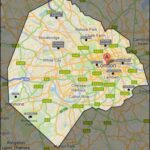Coffee and black tea are two of the world’s most beloved caffeinated beverages, offering that sought-after energy boost. If you’re trying to understand your caffeine intake, especially when choosing between these two drinks, you might be wondering: just How Much Caffeine Is In Black Tea Compared To Coffee? This article dives deep into the caffeine levels of both beverages, helping you make informed choices to suit your needs and preferences.
Unpacking Caffeine Levels: Coffee
Coffee is renowned for its robust caffeine kick, but the actual amount can vary widely depending on several factors. The type of coffee bean, roasting level, brewing method, and serving size all play a role in determining the final caffeine content.
Generally, brewed coffee leads the pack in caffeine concentration. An 8-ounce (237 mL) cup of standard brewed coffee contains approximately 96 mg of caffeine. For those opting for a quicker fix, instant coffee still delivers a significant dose, with about 62 mg of caffeine in the same 8-ounce serving. Espresso, known for its concentrated flavor and caffeine, packs around 63 mg of caffeine in just a 1-ounce (30 mL) shot. Decaffeinated options are available for those sensitive to caffeine or wishing to reduce their intake, though even decaf isn’t entirely caffeine-free. Decaf brewed coffee still has about 1mg per 8oz cup, while decaf espresso contains roughly 1mg per 1oz shot.
Factors influencing coffee’s caffeine content include:
- Bean Type: Arabica and Robusta beans have different caffeine levels, with Robusta generally containing more caffeine.
- Roast Level: Lighter roasts tend to retain slightly more caffeine than darker roasts, although the difference is often negligible.
- Brewing Method: Methods like drip brewing, pour-over, and French press can extract varying amounts of caffeine.
Tea Time: Caffeine in Black Tea
Black tea, while often perceived as having less caffeine than coffee, still contains a notable amount of this stimulant. Similar to coffee, the caffeine content in black tea is subject to variations depending on factors such as tea type, processing, brewing time, and serving size.
An 8-ounce (237 mL) cup of brewed black tea typically contains around 48 mg of caffeine. Ready-to-drink bottled black tea might have slightly less, averaging about 26 mg of caffeine per 8-ounce serving. Decaffeinated black tea options are also available, significantly reducing caffeine content to about 2 mg per 8-ounce cup. Green tea, often considered a milder alternative, contains about 29 mg of caffeine in an 8-ounce brewed cup, placing it between black tea and decaf options in caffeine levels.
Factors affecting caffeine in black tea include:
- Tea Variety: Different varieties of black tea, such as Assam, Darjeeling, or Earl Grey, can have slightly different caffeine profiles.
- Processing: The level of oxidation during processing can influence caffeine levels.
- Brewing Time: Longer steeping times generally result in higher caffeine extraction.
Black Tea vs. Coffee: A Caffeine Showdown
When directly comparing black tea and coffee, it’s clear that coffee generally has a higher caffeine content per serving. An average 8-ounce cup of brewed coffee delivers approximately twice the caffeine of an equal serving of brewed black tea (96 mg vs. 48 mg). Espresso shots, though smaller in volume, are also more caffeine-dense than black tea.
However, it’s important to consider serving sizes and individual preferences. People often consume larger mugs of coffee than tea, which would further increase the caffeine intake from coffee. Conversely, some may prefer the gentler caffeine lift provided by black tea, finding it less likely to cause jitters or anxiety compared to coffee’s more intense effect.
Here’s a quick comparison based on the provided data:
| Beverage | Size (oz) | Caffeine (mg) |
|---|---|---|
| Brewed Coffee | 8 | 96 |
| Brewed Black Tea | 8 | 48 |
| Espresso (shot) | 1 | 63 |
Alt Text: A table comparing caffeine amounts in coffee, tea, soda, and energy drinks, highlighting the difference in caffeine levels between brewed coffee and brewed black tea.
Health Considerations and Caffeine Consumption
Experts suggest that up to 400 milligrams of caffeine per day is considered safe for most healthy adults. Both coffee and black tea can be part of a moderate caffeine intake. Choosing between them often comes down to personal preference regarding taste and the desired level of caffeine stimulation.
It’s also worth noting that caffeine affects individuals differently. Factors like body weight, metabolism, and caffeine sensitivity can influence how you react to both coffee and black tea. Those who are pregnant, breastfeeding, or have certain health conditions should consult with healthcare professionals regarding their caffeine intake.
Ultimately, understanding the caffeine content of black tea compared to coffee empowers you to make informed decisions about your beverage choices. Whether you prefer the powerful jolt of coffee or the milder boost of black tea, moderation and awareness are key to enjoying these drinks as part of a balanced lifestyle.
References:
- Caffeine content for coffee, tea, soda and more. Mayo Clinic. https://www.mayoclinic.org/healthy-lifestyle/nutrition-and-healthy-eating/in-depth/caffeine/art-20045678
- Spilling the beans: How much caffeine is too much. U.S. Food and Drug Administration. https://www.fda.gov/consumers/consumer-updates/spilling-beans-how-much-caffeine-too-much
